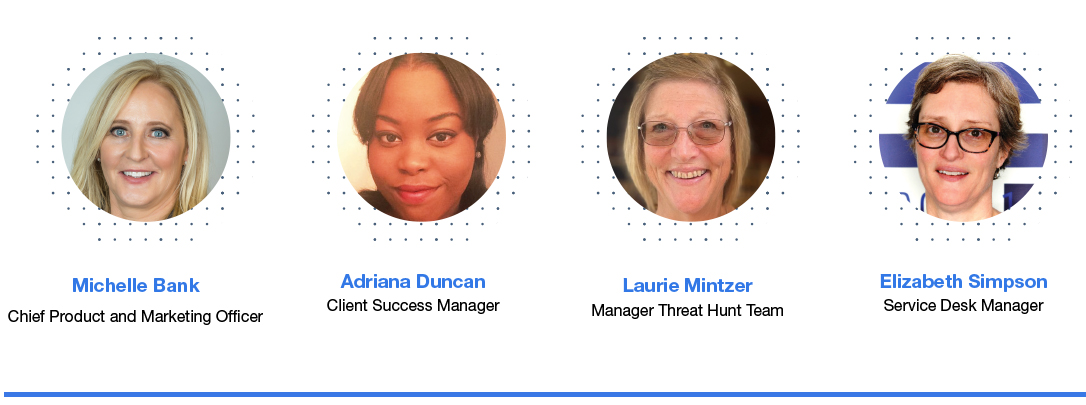A Look Inside the Careers of Four Women in Cybersecurity
Currently, women hold 25% of cybersecurity jobs globally. While that number has more than doubled since 2013, it still leaves a lot of room for growth. Why such a large gender gap? It’s no secret that cybersecurity and tech in general have often been viewed as masculine industries. In some circles there are misguided ideas that men are more suited for STEM careers than women. The truth is, women bring critical knowledge, perspectives and experiences that are desperately needed in the cybersecurity space.
In this article, we’ll introduce you to four women at Nuspire who have established careers they love in cybersecurity. You’ll learn the varied paths they took to get into cybersecurity (from highly technical to non-technical), what they love about it and their advice to other women looking for a career in the field.
Michelle Bank
Chief Product and Marketing Officer
What do you do for Nuspire?
“I’m the CPO and CMO for Nuspire. On the product side, I’m responsible for product management, which includes being of the voice of the client experience, services and features. For marketing, it’s all about bringing our products and services to life in the eyes of perspective buyers and building brand awareness.”
How did you get into cybersecurity?
“I’ve always had an interest in technology and have worked in the B2B technology space since the start of my career. Some of the larger telecommunications companies I worked at had cybersecurity as part of their portfolio, and I found it really interesting. When I had the opportunity to join a company solely dedicated to cybersecurity, I was excited because the entire focus would be on stopping the bad guys and doing good in the world.”
What do you love about working in cybersecurity?
“Cybersecurity is really about helping people and fighting cybercrime. I’m not a SOC analyst or in a super technical role, but I get to be part of something that is rooted in protecting others. It’s a way to give back.”
What are your thoughts on the cybersecurity talent shortage – especially among women?
“There are stats out there that show women don’t put themselves forward for a job if they don’t have all the qualifications. Here’s the deal – no one has all the qualifications. It’s a matter of having the confidence to know that you have the drive and intellectual curiosity to do the job.”
What advice do you have for women looking to get into cybersecurity?
“Look for resources on how to build the skillsets you need. I had a boss once that said, ‘try to do the job before you get the job,’ which is a great way to learn not only what skills you may need to work on, but also what you like and don’t like.
You should also have clarity on what you want to do in cybersecurity. I was talking to a friend who’s also in this industry, and she said sometimes during interviews, candidates tell her they don’t know what they want to do. This makes it really hard because there are so many types of jobs in cybersecurity, and it’s not the recruiter’s job to figure out where you fit. You don’t have to know exactly what you want to do, but at least have an idea.
Once you’re in the door, have a voice. Ask questions, be curious and find someone in the company who can be your advocate.”
Adriana Duncan
Client Success Manager
What do you do for Nuspire?
“I started at Nuspire as a service desk supervisor, where I managed the help desk. Then I moved into a client success manager (CSM) role, which is all about making sure our clients are set up for success. I am always talking with our clients, making sure tickets are being worked on and ensuring their services are meeting their needs.”
How did you get into cybersecurity?
“Believe it or not, I had no desire to get into cybersecurity – mainly because I didn’t know much about it. Prior to my role at Nuspire, I worked in IT for a casino, and I really liked it, but COVID happened, and no one was coming to the casino. I saw this as an opportunity to explore new opportunities in the technology space, and Nuspire kind of fell in my lap. After researching the company and its values and culture, it turned out to be a perfect fit for me – and I learned I’m really interested in cybersecurity.”
What do you love about working in cybersecurity?
“I love that I can help people and that I’m always learning something new. Cybersecurity is constantly changing – there’s never a dull moment.”
What are your thoughts on the cybersecurity talent shortage – especially among women?
“I grew up in a family that worked in the medical field. It was all about helping other people, and the expectation was that I would be a doctor or nurse or educator. I think women are often pushed in that direction of being the caregiver, which creates this perception that technology-focused fields aren’t a viable career path. It’s actually the opposite.”
What advice do you have for women looking to get into cybersecurity?
“Just go for it! As women, we carry a lot, and we tend to overthink things. You don’t have to know everything, and if you’re not super techie but want a techie role, there are plenty of resources out there for you. Talk to friends in the field and ask a lot of questions. And don’t be so afraid of rejection that you don’t apply for a job you want.”
Laurie Mintzer
Manager, Threat Hunt Team
What do you do for Nuspire?
“I’m a threat hunt manager, which includes not only managing the threat hunt team, but also hunting threats myself. Our team is all about doing things proactively – we dig around for anomalies before they’re alerted. When we find them, we do a lot of research and provide that information to our security operations center (SOC).”
How did you get into cybersecurity?
“I fell into it. I was one of those nontraditional college students who got married and had children before I went for my degree. I studied business administration back in the 1980s because I didn’t want to be a secretary. One of my courses was Intro to Computers and I loved it so much, I switched my major to programming. I spent years building computers from the ground up, then opened my own company in 1994 and ran that for 20 years.
The evolution of the industry happened fast, so I went back to school in 2010 to become a certified computer forensics examiner, which piqued my interest because it was all about shutting the bad guys down. I did that for five years, then decided to close my business and move to another state. I didn’t want to start a new business and thankfully, I connected with an MSSP, which is right up my alley. I’m in my fourth year at Nuspire.”
What do you love about working in cybersecurity?
“I love the constant change – I’m always learning, always moving, always having that challenge. And I love that I can use what I’m learning almost instantaneously.”
What are your thoughts on the cybersecurity talent shortage – especially among women?
“When women look at a job description, they want to meet all the requirements before they apply. Men don’t have the same reservations. When I was looking for a job, a close friend told me, ‘Don’t say no to yourself, let them tell you no,’ and that’s the way I think we should approach job opportunities.”
What advice do you have for women looking to get into cybersecurity?
“There are so many resources out there now, and many are free. For example, Udemy has a ton of inexpensive courses you can take to learn more about a variety of cybersecurity-focused topics. There are also a lot of meetups and local events you can attend to get a better sense of the industry and to meet people who can help you along your journey.”
Beth Simpson
Service Desk Manager
What do you do for Nuspire?
“I’ve been at Nuspire for 10 years and am currently the manager of our service desk. I wear a lot of other hats in the organization, including operations liaison for internal software implementation.”
How did you get into cybersecurity?
“I started as a stay at home mom, taking care of my three kids for 10 years. After that, I was a 911 operator and dispatcher, where I got a lot of experience in how to calm people down and stay focused on the situation. This translated well when I came to Nuspire almost 10 years ago. Overseeing the service desk requires empathy and the understanding that people want is to get their problem resolved.”
What do you love about working in cybersecurity?
“Cybersecurity isn’t just about penetration testing and stopping bad actors. There are so many people in support roles like HR, project management, installation teams, supporting the tools of the organization. These roles are just as valuable to fight security risks and once you start there, you can go anywhere in cybersecurity as you learn more about it.”
What are your thoughts on the cybersecurity talent shortage – especially among women?
“Cybersecurity is a fast-growing field, and it can seem risky. I think women are often risk-averse, depending on where they are in their lives and careers. I also think it’s a newer field in IT and women typically aren’t the first to jump into a new technology.
What advice do you have for women looking to get into cybersecurity?
“Start to learn to think outside the box. We tend to be rule followers, and cyberattackers don’t follow rules. Look at getting certifications in the cybersecurity field and join related groups like Women Who Code. Get a mentor to help guide you and don’t be daunted to bring ideas to the table that’s full of mostly men.”
At Nuspire, we are honored to have these amazing women on our team. We know that closing the gender gap in cybersecurity brings more diversity in perspectives and experience, which is critical to addressing the challenges in our industry. Threat actors come from a variety of different backgrounds, and by having a diverse team that can identify with varied experiences, we can better defend against the bad guys.


